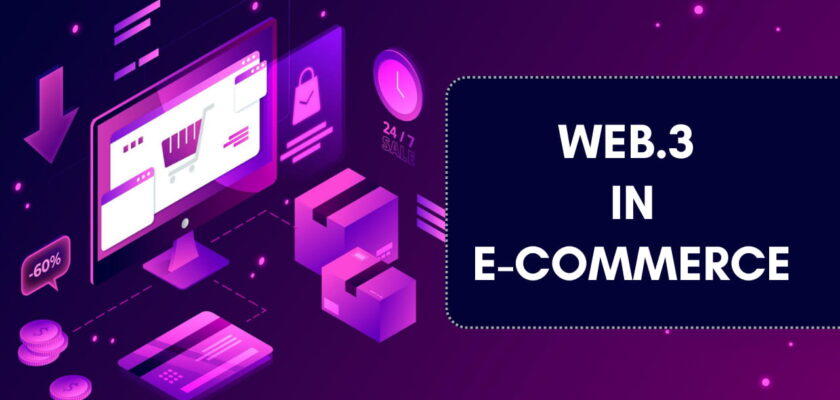During Web 1.0, the internet was mainly used to access and share content. During this period, the overall technology infrastructure was primitive, and the user experience was limited. Web 2.0 then came with improved technology, more intuitive interfaces, more features, and more interactivity.
Web 3.0 is the cutting-edge new variation of the global Internet powered by various tech advancements like blockchain and AI. This ground-breaking implementation of the web3 in E-Commerce brands in a multi-dimensional manner. Be it lucrative product presentation or creating a seamless and secure check-out experience, these technologies will help in every single aspect.
According to Morgan Stanley, the eCommerce market will reach $5.4 trillion by 2026, and Web 3.0 will play a pivotal role. In this article, let’s explore how eCommerce brands can prepare for this upcoming decentralized disruption and how they can make the most of it.
But before diving into it, let’s explore Web 3.0.
What exactly is Web 3.0 and How is it different?
With the growing demands for data privacy, the need for an efficient, secure, and trustless web has been felt by users.
In simplified terms, the third version of the web is an authority-less decentralized place where internet users have superior control over their shared and personal data. They can have peer-to-peer interaction among their friends or with brands leveraging blockchain technology with controlling authority.
It eliminates middlemen, thus providing eCommerce brands with enhanced customer engagement and transparency. Furthermore, it eliminates the risk of cyberattacks and makes data processing much faster. The latest version of the web is powered by tech advancements like machine learning, AI technologies like GPT-3, and blockchain protocols like ERC-20 and ERC-721.
This makes it more reliable and secure than the previous versions, and users can trust it for their online transactions.
The decentralized architecture of Web 3.0 also opens up numerous opportunities for eCommerce brands to provide better customer experiences.
How can eCommerce Companies Get Started with Web 3.0?
Leveraging blockchain advancement:
Blockchain advancement is the key performer of the 3.0 version of the web, and it ensures a seamless and secure online shopping or browsing experience. It stores user data on an immutable ledger that is secured with cryptography, making it almost impossible to access without permission.
This makes blockchain-backed eCommerce stores more secure and trustworthy than traditional online stores. eCommerce brands can use blockchain to store user data, track inventory, process payments, and even manage customer loyalty programs.
Blockchain technology can put eCommerce companies and their users at ease, as it eliminates the risk of data theft, unauthorized transactions, and malicious attacks. In 2022 and beyond, more people now seek secure online stores, and blockchain-powered eCommerce is becoming the go-to option for many.
Enabling end-to-end payments in cryptocurrency:
Cryptocurrency is another technology expected to gain prominence in the coming years. Cryptocurrencies have various in-depth use cases across different industries, like making P2P payments, managing data using smart contracts, and streamlining transaction operations.
Their decentralized nature also eliminates unnecessary fees and makes them a more secure payment option compared to traditional methods like credit cards and PayPal. Many eCommerce brands are now offering their customers the option to pay in cryptocurrency, which can make online shopping more accessible and more secure for users.
By accepting payments in cryptocurrencies, eCommerce stores can tap into a new customer base, as many people prefer digital currencies over traditional payment methods.
Implementing token-gated commerce:
Token-gated commerce is a new form of eCommerce where users are required to possess specific tokens before purchasing products from an online store. Tokens are like digitally-created virtual value assets holding unique values used to purchase items across the web.
This system cuts down the requirement for multiple third-party arbitrators and makes the overall transaction process more robust. eCommerce brands can use token-gated commerce to create exclusive, members-only shopping experiences for loyal users. This can help them build loyalty and trust among their customers while providing more secure transactions.
Additionally, this system allows eCommerce stores to customize their offers and promotions for specific users or groups. This makes token-gated commerce an excellent tool for eCommerce brands looking to create personalized customer experiences.
Data-focused strategies for brand marketing:
Leveraging Web 3.0, customers can access and manage their data online in a more streamlined manner. This means that eCommerce brands can use this data to create effective marketing strategies and optimize their campaigns.
Data-driven insights can help them understand their customers better, personalize their services, and target the right audiences with relevant messages. Such data-driven campaigns are expected to be more effective than traditional methods and can help brands maximize their reach and engagement.
It also helps eCommerce stores stay ahead of the competition and get more insights into their customer’s needs and preferences, thus creating better customer experiences. In addition, eCommerce owners can leverage blockchain frameworks to ensure user data is stored securely and accessed with permission.
Leveraging the potential of metaverse:
Metaverse is a virtual world that uses blockchain technology to store data in a decentralized manner. It lets internet users interact securely with the community and derive unique experiences on a virtual platform.
Digital commerce brands can smartly integrate this tech advancement to deliver an impressive shopping experience to their customers. They can create interactive virtual stores and design them according to their customer’s needs, integrating features like AI-based customer service and interactive product demos.
This will help eCommerce stores better engage with their customers and provide them with a unique shopping experience. It can be a great way to stand out from the crowd and deliver an immersive shopping experience to customers.
Read More – How to Buy NFT A step-by-step Guide
Introducing NFTs and their customizations:
NFTs are unique asset tokens that are stored on blockchain-based ledgers and are used to track ownership and authenticity.
This technology is becoming more popular in eCommerce, as it allows online stores to create digital collectibles and engage with their customers in a new way. With NFTs, brands can offer exclusive items or limited-edition merchandise that are unavailable elsewhere.
They can also offer personalized experiences, such as customizing products based on customer preferences or leveraging blockchain technology to protect intellectual property rights. This can help eCommerce stores differentiate themselves from the competition and make their products more attractive to customers.
Blockchain use cases to revolutionize Web 3.0 digital retail
As the “next layer” of the internet depends on advanced blockchain implementation, eCommerce businesses should prepare and explore the use cases of blockchain that can affect their business. Some of the transforming use cases of blockchain in Web 3.0 eCommerce are:
Implementing peer-to-peer transparency:
Blockchain technology enables eCommerce stores to store and access transaction data securely and transparently. It helps stores cultivate and build higher trust among buyers and cut off the intermediaries which might be a threat to data protection.
It also enables them to keep track of their supply chain, ensuring that customers get only high-quality products. This ensures that customers can be sure of the origin and quality of their purchases, making them more likely to buy from the store again. This higher level of trust can help eCommerce stores increase their customer base and gain a competitive edge.
Smart contracts implementation:
Smart contracts are self-executing data-driven secure contracts that store digital agreements between multiple parties. This helps eCommerce brands create contracts for transactions without involving third parties, thus eliminating the need for manual paperwork and time-consuming processes.
Smart contracts also help automate payments, as they can be set up to trigger prices when certain conditions are met. It ensures all involved parties are paid in a jiffy with intact data security. Moreover, smart contracts also eliminate potential threads like data fraud, forgery, and breach of contracts.
These features make smart contracts an excellent tool for eCommerce stores looking to streamline their operations and create trust among all stakeholders in the transaction.
Persona-based customized promotions for higher ROI:
Blockchain technology can also be used to create tailored promotions for customers. With blockchain, eCommerce stores can track their customer’s purchase history and preferences, enabling them to design more targeted campaigns that have a higher return on investment (ROI).
This helps eCommerce stores better understand their customer base and create offers that are more likely to convert. This can help them increase their sales and customer loyalty in the long run.
As the majority of brands are relying on generic and automated bulk promotion tools, using blockchain-based tailored promotions can help eCommerce stores stand out from the rest and deliver an enhanced shopping experience to their customers.
Tracking products warranties and replacements:
Another use of blockchain in eCommerce is tracking product warranties and replacements. With the help of a blockchain-based ledger, eCommerce stores can keep track of their customers’ purchase history and verify whether they are eligible for a warranty or replacement in case of damage or malfunction.
This helps them provide better customer service while also minimizing fraud and ensuring that customers receive only genuine replacements.
eCommerce stores need to understand the use cases of blockchain in Web 3.0 and prepare for its implementation in order to stay ahead of their competitors and offer a better shopping experience to their customers.
Future of Web 3.0 eCommerce: What to expect?
The future of eCommerce lies in Web3 marketplace development, where the web is no longer controlled by digital commerce giants. In this world, blockchain technology and decentralization will be the key drivers of growth. Below are the key pillars of the future of Web 3.0 eCommerce:
Rise of DTC shopping models:
Direct-to-customer (DTC) models will become increasingly popular in the near future as they offer customers better control over their data and a more personalized shopping experience. With blockchain, eCommerce stores can store customer data securely on the ledger, which gives customers the power to decide who can access it. Moreover, DTC models are more personalized in terms of product offerings, promotions, and customer service.
Omnichannel seamless communication:
Blockchain technology can enable eCommerce stores to create an omnichannel communication system, making it easier for customers to interact with them across multiple channels. This can be done by creating a single unified ledger where customers’ data is stored and tracked, allowing them to access the same information regardless of which channel they use.
AI-based prompt customer service:
AI-powered chatbots and virtual agents will become increasingly important in the future of eCommerce, as they can offer personalized customer service and help stores manage customer inquiries more effectively. With the use of blockchain technology, these chatbots and virtual agents can be trained to respond quickly and accurately to customer queries.
Decentralized marketplaces for enhanced shopping experiences:
Blockchain technology will enable the emergence of decentralized marketplaces where buyers and sellers can explore a wide range of products from different vendors. This will provide customers with more options to choose from and help businesses tap into new markets.
Better customer acquisition and retention:
By leveraging blockchain-based analytics, brands can gain a better understanding of their customer base and create targeted campaigns that drive customer acquisition. This will help them reach out to new customers and increase their sales. As of today, there are numerous blockchain-based analytics solutions available that can provide insights into customer behavior and help brands create effective marketing strategies.
Wrapping up!
The next step for eCommerce brands is to start exploring the potential of Web 3.0 and discover how they can leverage it to gain a competitive edge. By understanding the potential of Web 3.0, eCommerce brands can prepare themselves to take advantage of the opportunities that come with it.
From implementing blockchain technology to using data-driven marketing strategies, eCommerce stores can capitalize on the new version of the internet to provide better customer experiences and stay ahead of the competition. With the right strategies in place, eCommerce stores transform the way they operate and boost sales and revenue.
Build an immersive and interactive eCommerce store in Web3 to explore emerging technology opportunities.
Read More – Best NFT Games in 2022 that Are Worth Your Attention

